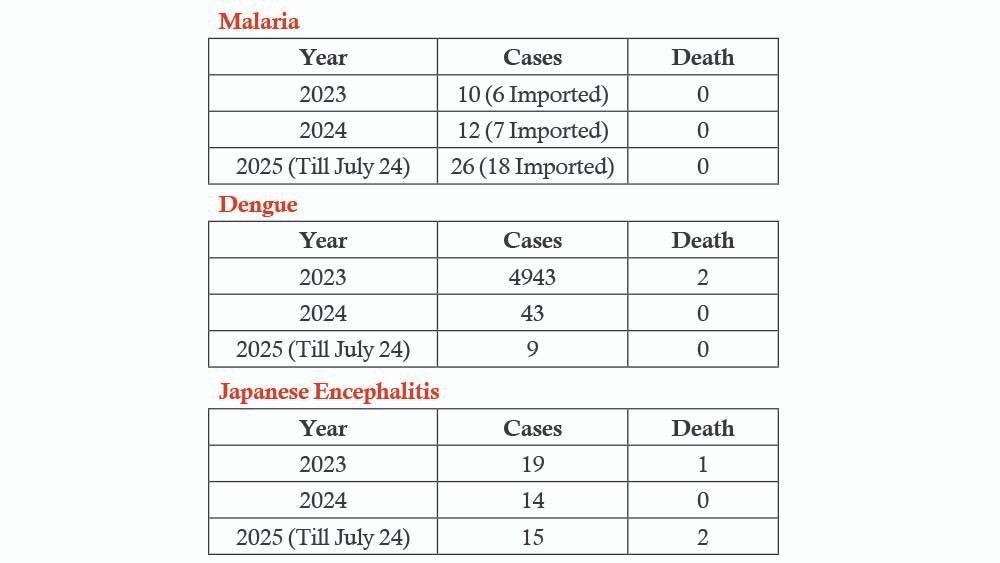With onset of monsoon heralding likely spread of various vector-borne diseases in the foothill areas and with the dreaded Japanese Encephalitis(JE) making its presence with two cases already reported, an advocacy meeting on the prevention and control of vector borne diseases (VBDs) was held Friday at the Chümoukedima Town Council Hall under the aegis of the District Vector Borne Diseases Control Programme (DVBDCP).
The programme focused on tackling diseases such as Japanese encephalitis (JE), dengue, and malaria.
Deputy director, National Vector Borne Disease Control Programme (NBVDCP) Dr. Tinurenla Anichari informed that the programme covered six major diseases- malaria, JE, dengue, chikungunya, kala-azar, and filariasis. However, she pointed out that though kala-azar and filariasis did no occur in Nagaland, yet there should be heightened public awareness-cum-vigilance at Dimapur since it is the state’s entry point.
She emphasized on community participation and strategies against JE such as child immunisation,
proper waste disposal, clean drainage maintenance, awareness campaigns, rapid response teams, and regular monitoring of irrigation to curb the spread of VBDs.
She highlighted on vector control through source reduction such as – larvicidal activities, and serological testing in pigs to detect JE.
DVBDC member Peter Sangtam highlighted the nature of disease vectors—organisms that transmit infections between humans or from animals to humans. He noted that among the most common of this were disease vectors and elaborated on transmission modes and symptoms of malaria, dengue, and JE.
Sangtam said JE primarily affects children, with symptoms such as high fever, disorientation, paralysis, and neurological complications. Since pigs and water birds act as reservoir hosts for JE, he said animal surveillance was a critical preventive measure.
Other preventive measures he highlighted included several personal and community-level precautions such as use of long-lasting insecticidal nets (LLINs), long-sleeved clothing during dawn and dusk, mosquito repellents, door and window mesh, elimination of stagnant water, cleaning and covering water containers, and organising clean-up drives with public participation.
UVBDS assistant director Kikolu Kheiya, provided updates on current control efforts in Dimapur. He said mosquitoes remained the primary target for intervention and advised weekly cleaning of water-collecting areas and recommended biological methods like using larvivorous fish-available at the CMO’s office- for controlling larvae in stagnant water.
He also cautioned against indiscriminate fogging, unless conducted under expert guidance, as improper use could harm humans and cause insecticide resistance among mosquitoes,.
Chümoukedima chief veterinary officer (CVO) Dr. Imnasungla Imsong reminded that JE was a viral disease impacting animals, particularly pigs and horses. She emphasised three pillars of veterinary response—surveillance, awareness, and vaccination.
She said the department had recently conducted JE serological surveillance in three locations across Chümoukedima and Dimapur where 23 out of 54 samples tested were detected as positive. She urged livestock owners to maintain hygiene in animal shelters and ensure that pigsties were not located near human dwellings.
Though there is no national vaccination programme for animals against JE, the CVO said the Animal Husbandry & Veterinary Services Department has proactively initiated containment measures. She clarified that infected pigs do not pose risks to consumers, but recommended precaution in consuming meat from infected animals to curb the spread.
Earlier, the programme was chaired by District Programme Officer (Child Development-I) and DSO, Dr. A. Kavito Zhimomi. CMOs of Dimapur, Chümoukedima and Niuland, Dr. Yartelna Jamir delivered the welcome address, and EAC Chümoukedima delivered the keynote address. An interactive session moderated by Dr. Imkongtemjen Longchar was also held.
Health officials flag rising vector-borne disease cases
Staff ReporterDIMAPUR, JUL 25 (NPN)

